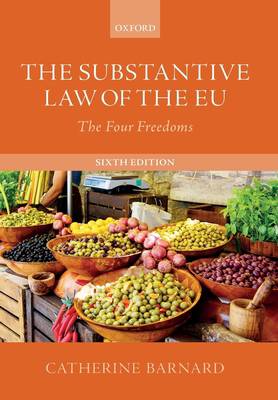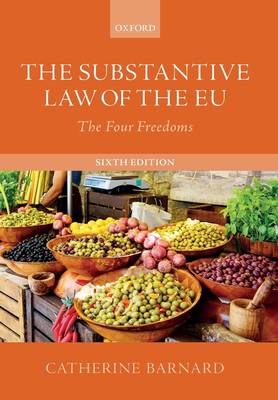
- Retrait gratuit dans votre magasin Club
- 7.000.000 titres dans notre catalogue
- Payer en toute sécurité
- Toujours un magasin près de chez vous
- Retrait gratuit dans votre magasin Club
- 7.000.0000 titres dans notre catalogue
- Payer en toute sécurité
- Toujours un magasin près de chez vous
62,95 €
+ 125 points
Description
The leading textbook on the four freedoms, popular with students and academics alike. This authoritative text offers a unique balance of comprehensive, detailed coverage in a concise and readable style, providing a critical and thorough analysis of the key principles of the substantive law of the EU. An introductory chapter provides valuable context on the governance of the internal market, its evolution, and the theories behind its key principles. Each of the freedoms is then dealt with in turn, covering goods, persons, services, and capital, before moving on to discuss harmonization, the regulation of the internal market, and its future. Additional useful detail is captured in footnotes, while directed further reading lists provide support for independent study and research. This thorough coverage is fully supported by engaging case studies throughout the book which place the law in context, helping you to understand the complexities of the subject and exploring the practical implications of EU law. Diagrams, flowcharts, and tables offer further detail and illustrate key ideas and processes in an easily accessible format, while chapter overviews, chapter content lists, and a clear structure ensure readers remain on track and can find information quickly. Online resources
The book is accompanied by online resources which include:
-an online chapter on the common commercial policy
-useful weblinks and further reading advice
-a searchable table of equivalences for quick reference to article numbering changes For lecturers: downloadable versions of the figures from the book are also available for use in lectures and handouts.
The book is accompanied by online resources which include:
-an online chapter on the common commercial policy
-useful weblinks and further reading advice
-a searchable table of equivalences for quick reference to article numbering changes For lecturers: downloadable versions of the figures from the book are also available for use in lectures and handouts.
Spécifications
Parties prenantes
- Auteur(s) :
- Editeur:
Contenu
- Nombre de pages :
- 744
- Langue:
- Anglais
Caractéristiques
- EAN:
- 9780198830894
- Date de parution :
- 14-10-19
- Format:
- Livre broché
- Format numérique:
- Trade paperback (VS)
- Dimensions :
- 170 mm x 244 mm
- Poids :
- 1270 g

Les avis
Nous publions uniquement les avis qui respectent les conditions requises. Consultez nos conditions pour les avis.






